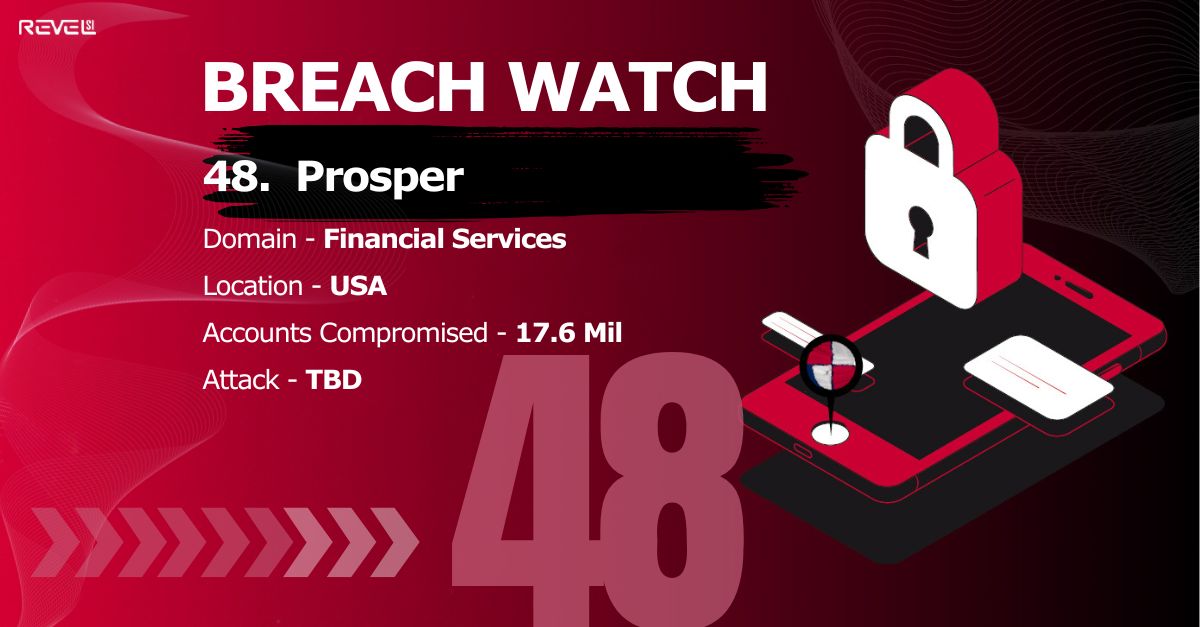The Prosper Data Breach: When Trust in Fintech Meets a Security Reality Check

Overview
Prosper Marketplace, one of the best-known peer-to-peer lending platforms in the United States, recently confirmed a major data breach affecting more than 17 million people. The company, which connects individual investors with borrowers through its online platform, disclosed that unauthorized actors accessed parts of its internal systems and retrieved sensitive personal data belonging to customers and loan applicants.
While Prosper emphasized that no bank accounts or funds were directly compromised, the scale and sensitivity of the exposed information make this one of the most significant fintech-related security incidents of 2025. For a company built on trust and financial credibility, the implications reach far beyond technical details - they strike at the heart of customer confidence.
How It Happened
According to Prosper’s official statement and several cybersecurity reports, the breach was discovered in early September 2025 after unusual queries were detected in the company’s databases. These “unauthorized queries” came from within systems that store user records, suggesting that the attackers either gained access through stolen credentials or exploited a weakness in Prosper’s internal access controls.
The compromised data included names, physical addresses, email addresses, birth dates, government-issued identification numbers (such as U.S. Social Security numbers), income levels, employment details, and credit-related information. In other words, nearly every piece of information required to identify or impersonate a person.
Security researchers later confirmed that some of this data appeared on underground forums, where it was being traded or offered for download. The leak was added to the public database Have I Been Pwned, confirming that 17.6 million unique email addresses were part of the exposed dataset.
Prosper maintains that customer accounts and the platform’s financial operations were not directly affected, meaning attackers did not move or steal funds. However, the exposure of such detailed personal information can be just as damaging in the long run.
Risks
The real danger of this breach lies not in immediate financial theft but in identity misuse. When attackers have access to names, birth dates, and ID numbers, they can open fake accounts, apply for loans, or carry out tax fraud in someone else’s name.
The stolen information can also fuel highly convincing phishing and social-engineering attacks. Victims may start receiving personalized emails or calls that sound legitimate - perhaps even referencing their real income or loan status - tricking them into revealing more information or sending money.
For Prosper, the reputational impact could be equally serious. As a platform operating in a highly regulated space, it now faces questions about how well it protected sensitive financial data and whether its internal monitoring was sufficient.
In the broader fintech ecosystem, the incident serves as another reminder that even the most trusted platforms are vulnerable to internal or credential-based compromises - the kind that firewalls and antivirus software alone can’t prevent.
Recommendations
For those who have ever used Prosper, or who simply want to protect themselves from similar incidents, a few practical steps can go a long way. First, check whether your email address was part of the breach through Have I Been Pwned. If it appears on the list, change any passwords you used with Prosper and make sure those passwords aren’t reused elsewhere.
Enable multi-factor authentication (MFA) on your financial and email accounts whenever possible — this adds a crucial layer of security even if your password is compromised. Stay alert for unexpected emails, texts, or phone calls claiming to come from Prosper or other financial institutions. Scammers often use data from breaches to appear more credible, sometimes referencing real details to gain trust.
If you are in the United States, consider placing a credit freeze or fraud alert with major credit bureaus to prevent anyone from opening accounts in your name. International users can check with local credit agencies for equivalent protection options.
Finally, remember that transparency matters. Prosper says its investigation is ongoing and that affected individuals will be notified directly. If you receive an official notice, read it carefully - it may include free credit monitoring or other protective measures.
A Broader Lesson
The Prosper breach is not just a story about stolen data; it’s a story about how digital trust must evolve. As more people rely on fintech platforms for loans, savings, and investments, the value of their personal information becomes just as critical as the money itself.
Protecting that information requires more than encryption or compliance - it demands vigilance, accountability, and continuous improvement. For users, it’s a reminder that financial convenience comes with a shared responsibility: to stay informed, cautious, and proactive in an increasingly connected world.
